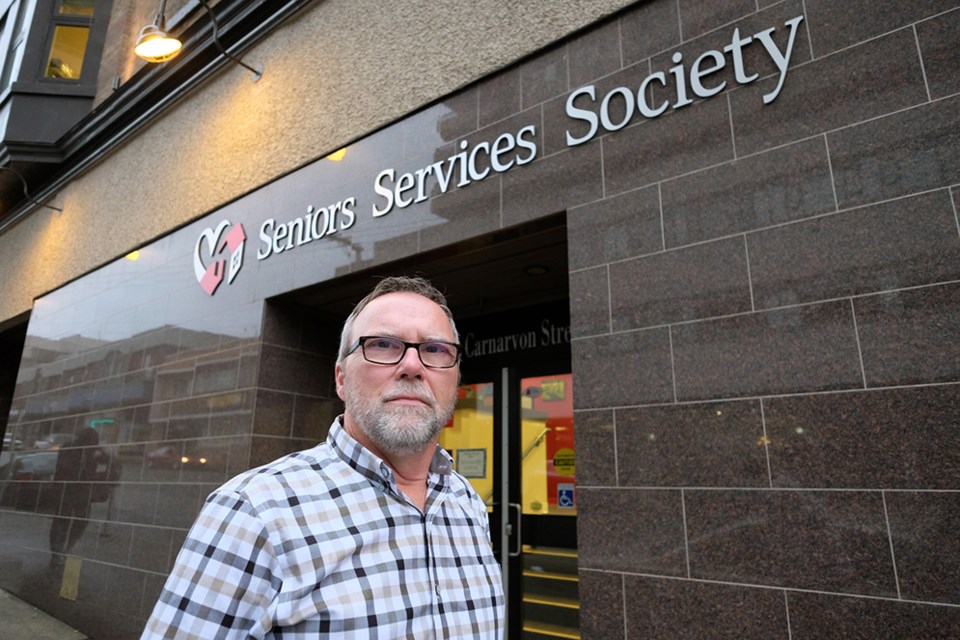A New Westminster organization is sounding the alarm over a new funding model that could leave homeless seniors out on the streets for months before they are eligible for help.
Brian Dodd, the interim executive director at Seniors Services Society, is worried newly homeless seniors won’t qualify for help under the government’s Housing First initiative, which focuses funding on people who are homeless for six months or more.
“We foresee seniors and homelessness becoming a big issue in 2015,” Dodd told The Record. “The majority of seniors we are dealing with are first-time homeless, so the funding and the programs are not available for us to assist them in moving forward. I’m calling it a crisis.”
Seniors Services Society is the only group that specifically helps seniors (55 or older) throughout the Lower Mainland who are homeless or at risk of homelessness. According to Dodd, about 80 per cent of the organization’s clients from the past year would not meet the new Housing First criteria, because they are homeless for the first time. Dodd is concerned seniors will have to stay out on the streets for six months before they qualify for help.
“That’s what we are facing,” he said.
As of April 2015, 65 per cent of the government’s annual $8.2 million in funding for homelessness in Metro Vancouver will be earmarked for Housing First, meaning the money goes to helping people who are chronically or episodically homeless.
The government defines “chronically” homeless as people with mental illnesses or addictions who have been homeless for six months or more, while “episodically” means people who have been homeless three times in the past year.
Dodd said the Housing First model is “brilliant,” because the people most in need are housed first, then offered help to deal with addictions or mental illnesses.
However, there’s less money available for everyone else that’s facing homelessness.
As a result, Dodd said Seniors Services Society only got a small amount of funding to help seniors who are not chronically and episodically homeless, and his organization had to cut back staffing hours.
The society typically deals with 150 seniors who need help with housing.
To make matters worse, Dodd says the number of homeless seniors is increasing as the baby-boomer generation ages. The 2008 Metro Vancouver Homeless Count, found 212 homeless seniors. In 2011, that number rose to 268, and then in 2014 it hit 371.
“We know this is a gross undercount, because there are a lot of people in the category we call hidden homeless,” Dodd said, explaining that seniors could be couch surfing. “There are street homeless and hidden homeless in our communities, and unfortunately, … many of those folks are seniors.”
Dodd ranked Vancouver as having the most pressing homelessness problems, followed by Surrey and then New Westminster/Burnaby.
Burnaby-New Westminster MP Peter Julian lauded the Conservatives’ Housing First plan but condemned the lack of new funding to support it. According to Julian, the Tories are “cannibalizing” existing homelessness programs to pay for the new Housing First initiative.
“Now we are creating a situation where people can’t access that funding for Housing First unless they’ve been on the street for six or eight months,” he said. “What kind of twisted logic is that?”
Julian has concerns for seniors in both Burnaby and New Westminster. He also blamed the former Liberal government for “destroying” Canada’s national housing plan.
“We need to start putting in place affordable housing units in this country. That’s a federal government responsibility,” he said.
Regional funding to help the homeless comes from the federal government’s Homelessness Partnering Strategy, which is investing more than $41 million in Vancouver and the surrounding areas for 2014 to 2019. Metro Vancouver is responsible for distributing that money to Lower Mainland groups that apply for grants. There is $8.2 million available each year, but 65 per cent of that funding is dedicated to Housing First, while the remaining 35 per cent is for everyone else.
According to the federal government, Housing First helps people transition to stable housing while saving taxpayers money.
According to a Mental Health Commission of Canada study, a Housing First model kept 73 per cent of participants in stable housing, as opposed to 32 per cent receiving standard care. The study also found that for homeless people using the highest levels of social services, the government saves an average of $21.72 for every $10 invested in Housing First.
The Record contacted the federal government for an interview, but no one was available. However, Marie-France Faucher from Employment and Social Development’s media relations office said some projects or activities may not be considered for Housing First funding but communities (such as Metro Vancouver) can use some of the government funding for non-Housing First projects.
“There may be cases where, with some adjustments, an organization’s project could adopt a Housing First approach,” she wrote in an email. “In other cases, the community may be able to use funding sources from other partners to continue projects or activities that will no longer receive HPS (Homelessness Partnering Strategy) funding.”
Follow Jennifer Moreau on Twitter, @JenniferMoreau



